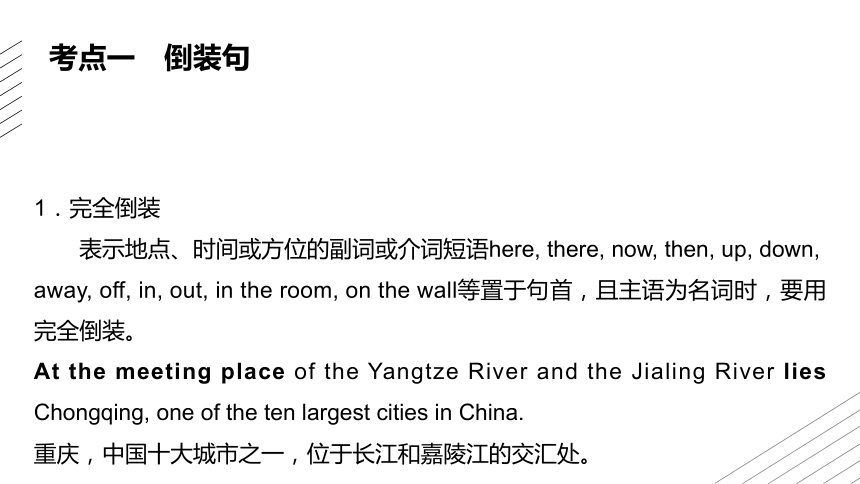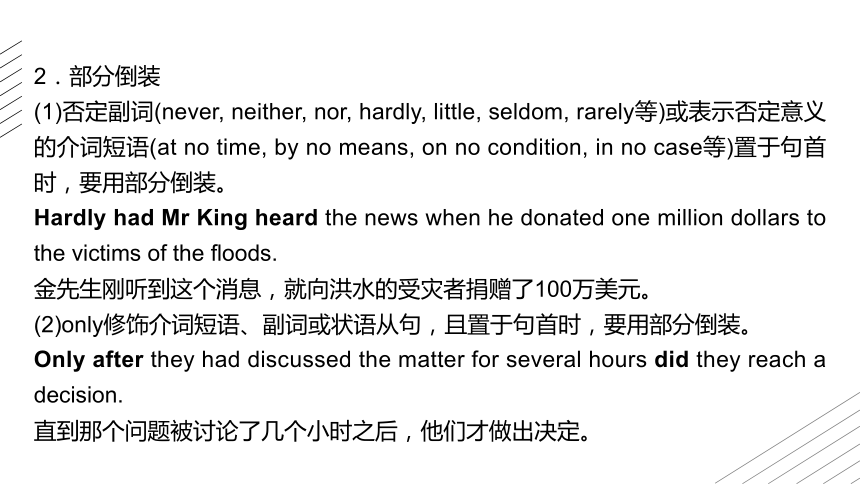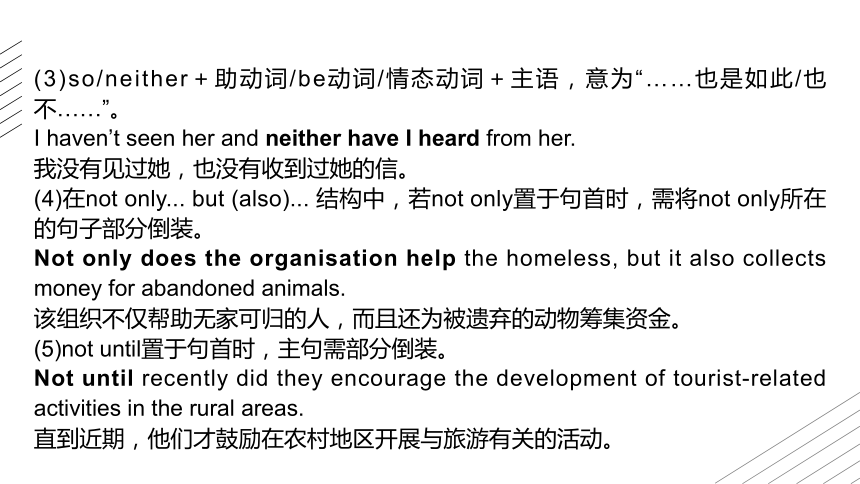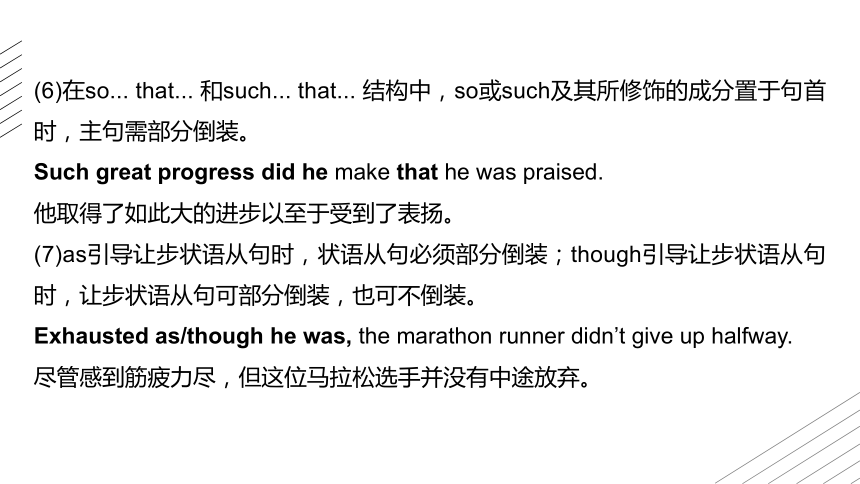2025年高考英语语法专题 课件 特殊句式
文档属性
| 名称 | 2025年高考英语语法专题 课件 特殊句式 |

|
|
| 格式 | pptx | ||
| 文件大小 | 225.5KB | ||
| 资源类型 | 试卷 | ||
| 版本资源 | 通用版 | ||
| 科目 | 英语 | ||
| 更新时间 | 2024-12-05 00:00:00 | ||
图片预览







文档简介
(共17张PPT)
板块二 并列句、三大从句和特殊句式
特殊句式
2025年高考英语专题复习
1.完全倒装
表示地点、时间或方位的副词或介词短语here, there, now, then, up, down, away, off, in, out, in the room, on the wall等置于句首,且主语为名词时,要用完全倒装。
At the meeting place of the Yangtze River and the Jialing River lies Chongqing, one of the ten largest cities in China.
重庆,中国十大城市之一,位于长江和嘉陵江的交汇处。
考点一 倒装句
2.部分倒装
(1)否定副词(never, neither, nor, hardly, little, seldom, rarely等)或表示否定意义的介词短语(at no time, by no means, on no condition, in no case等)置于句首时,要用部分倒装。
Hardly had Mr King heard the news when he donated one million dollars to the victims of the floods.
金先生刚听到这个消息,就向洪水的受灾者捐赠了100万美元。
(2)only修饰介词短语、副词或状语从句,且置于句首时,要用部分倒装。
Only after they had discussed the matter for several hours did they reach a decision.
直到那个问题被讨论了几个小时之后,他们才做出决定。
(3)so/neither+助动词/be动词/情态动词+主语,意为“……也是如此/也不……”。
I haven’t seen her and neither have I heard from her.
我没有见过她,也没有收到过她的信。
(4)在not only... but (also)... 结构中,若not only置于句首时,需将not only所在的句子部分倒装。
Not only does the organisation help the homeless, but it also collects money for abandoned animals.
该组织不仅帮助无家可归的人,而且还为被遗弃的动物筹集资金。
(5)not until置于句首时,主句需部分倒装。
Not until recently did they encourage the development of tourist-related activities in the rural areas.
直到近期,他们才鼓励在农村地区开展与旅游有关的活动。
(6)在so... that... 和such... that... 结构中,so或such及其所修饰的成分置于句首时,主句需部分倒装。
Such great progress did he make that he was praised.
他取得了如此大的进步以至于受到了表扬。
(7)as引导让步状语从句时,状语从句必须部分倒装;though引导让步状语从句时,让步状语从句可部分倒装,也可不倒装。
Exhausted as/though he was, the marathon runner didn’t give up halfway.
尽管感到筋疲力尽,但这位马拉松选手并没有中途放弃。
1.陈述句:It is/was... that/who... (强调人时可用that或who,强调物时只能用that)
一般疑问句:Is/Was+it+... that/who...
特殊疑问句:特殊疑问词+is/was+it+that/who...
I wonder what it is that makes you so addicted to the mobile phone.
我想知道是什么让你对手机如此着迷。
2.“not... until...”的强调句:It is/was not until... that... (注意时态)
It was not until I came here that I realised this place was famous for not only its beauty but also its weather.
直到我来到这里,我才知道这个地方出名不仅是因为它的美,还因为它的天气。
考点二 强调句
强调谓语动词,用“do/does/did+动词原形”。该结构只用于肯定句,并且只有一般现在时和一般过去时。
He did come to see you last Sunday, but you were out.
他上周日的确来看过你,但是你出去了。
1.状语从句的省略
当时间、条件、让步、方式等状语从句的主语和主句的主语一致或从句的主语是it且从句中含be动词时,可以省略状语从句中的主语和be动词,构成下列结构:连词+形容词/介词短语/动词-ing形式/过去分词/不定式。
Children, when accompanied by their parents, are allowed to enter the stadium.
当孩子由父母陪同时,他们才被允许进入体育馆。
考点三 省略句
2.不定式的省略
(1)在上下文中,为了避免重复,可以省略不定式中和前面句子中相同的动词(短语),只保留不定式符号to。常用在expect, hope, intend, mean, try, want, wish等词后。
Firstly, people may feel forced when asked to do things that they don’t want to.
首先,当人们被要求去做他们不想做的事情时,他们会感到是被迫的。
(2)but用作连词,意为“除……之外”时,如果前面有实义动词do,后接不定式时,常省略to;但前面没有实义动词do时,后接的不定式不省略 to。
All he could do was nothing but wait and see.
他所能做的只有等着看看(情况)。
3.if省略结构
if so如果这样的话
if not如果不是这样的话
if ever如果曾经有的话
if any如果有的话
if possible如果可能的话
if necessary如果有必要的话
1.感叹句
(1)what引导的感叹句
①What+a/an(+adj.)+可数名词单数+主语+谓语!
②What(+adj.)+不可数名词/可数名词复数+主语+谓语!
What a strange plant(=How strange a plant)! I’ve never seen it before.
这种植物真奇怪!我以前从未见过。
The shocking news made me realise what terrible problems we would face.
这个惊人的消息使我意识到我们将面临多么严重的问题。
考点四 其他特殊句式
(2)how引导的感叹句
①How+adj./adv.+主语+谓语!
How demanding the job is!
这份工作多么费力啊!
②How+adj.+a/an+可数名词单数+主语+谓语!
How clever a boy he is!
多聪明的男孩呀!
③How+主语+谓语!
How time flies!
时光飞逝!
2.祈使句
祈使句常用来表达命令、请求、禁止、建议、警告、劝告等。
(1)祈使句的主语一般是第二人称you(常省略,也可不省)。祈使句的否定形式一般在动词原形前加don’t,也可用副词never构成。祈使句的强调形式可以在句首加do。
Do your homework before you watch TV.
看电视之前要先做你的家庭作业。
Alice, you feed the bird today, will you
艾丽丝,今天你喂鸟,可以吗?
(2)祈使句表示假设的情况。
①祈使句+and/or+简单句
②名词词组(多含有more, another)+and+简单句
Call me tomorrow and I’ll let you know the lab result.
明天给我打电话,我会让你知道实验结果的。
Start out right away, or we’ll miss the first train.
立刻出发,不然,我们将要错过首班火车。
3.there be句型
(1)there be 句型中的be可以有不同的时态,可以和助动词或情态动词连用,并且be有时可用 live, remain, stand, lie, exist, seem to be, appear to be, happen to be, used to be等替换。
There have been many great changes in our country since then.
自从那时起,我国发生了很多巨大的变化。
Once upon a time there lived an old fisherman in a village by the sea.
从前,在海边的一个村庄里住着一位老渔夫。
(2)there be句型的常考句型:
There is no point/sense (in) doing sth. 做某事没有意义。
There is no/little doubt that... 毫无疑问……
There is no need (for sb.) to do sth. (某人)没有必要做某事。
There is (no) difficulty/trouble in doing/with sth. 做某事(没)有困难。
There is (no) possibility of (doing) sth./that... (做)某事(没)有可能性。
THANKS
板块二 并列句、三大从句和特殊句式
特殊句式
2025年高考英语专题复习
1.完全倒装
表示地点、时间或方位的副词或介词短语here, there, now, then, up, down, away, off, in, out, in the room, on the wall等置于句首,且主语为名词时,要用完全倒装。
At the meeting place of the Yangtze River and the Jialing River lies Chongqing, one of the ten largest cities in China.
重庆,中国十大城市之一,位于长江和嘉陵江的交汇处。
考点一 倒装句
2.部分倒装
(1)否定副词(never, neither, nor, hardly, little, seldom, rarely等)或表示否定意义的介词短语(at no time, by no means, on no condition, in no case等)置于句首时,要用部分倒装。
Hardly had Mr King heard the news when he donated one million dollars to the victims of the floods.
金先生刚听到这个消息,就向洪水的受灾者捐赠了100万美元。
(2)only修饰介词短语、副词或状语从句,且置于句首时,要用部分倒装。
Only after they had discussed the matter for several hours did they reach a decision.
直到那个问题被讨论了几个小时之后,他们才做出决定。
(3)so/neither+助动词/be动词/情态动词+主语,意为“……也是如此/也不……”。
I haven’t seen her and neither have I heard from her.
我没有见过她,也没有收到过她的信。
(4)在not only... but (also)... 结构中,若not only置于句首时,需将not only所在的句子部分倒装。
Not only does the organisation help the homeless, but it also collects money for abandoned animals.
该组织不仅帮助无家可归的人,而且还为被遗弃的动物筹集资金。
(5)not until置于句首时,主句需部分倒装。
Not until recently did they encourage the development of tourist-related activities in the rural areas.
直到近期,他们才鼓励在农村地区开展与旅游有关的活动。
(6)在so... that... 和such... that... 结构中,so或such及其所修饰的成分置于句首时,主句需部分倒装。
Such great progress did he make that he was praised.
他取得了如此大的进步以至于受到了表扬。
(7)as引导让步状语从句时,状语从句必须部分倒装;though引导让步状语从句时,让步状语从句可部分倒装,也可不倒装。
Exhausted as/though he was, the marathon runner didn’t give up halfway.
尽管感到筋疲力尽,但这位马拉松选手并没有中途放弃。
1.陈述句:It is/was... that/who... (强调人时可用that或who,强调物时只能用that)
一般疑问句:Is/Was+it+... that/who...
特殊疑问句:特殊疑问词+is/was+it+that/who...
I wonder what it is that makes you so addicted to the mobile phone.
我想知道是什么让你对手机如此着迷。
2.“not... until...”的强调句:It is/was not until... that... (注意时态)
It was not until I came here that I realised this place was famous for not only its beauty but also its weather.
直到我来到这里,我才知道这个地方出名不仅是因为它的美,还因为它的天气。
考点二 强调句
强调谓语动词,用“do/does/did+动词原形”。该结构只用于肯定句,并且只有一般现在时和一般过去时。
He did come to see you last Sunday, but you were out.
他上周日的确来看过你,但是你出去了。
1.状语从句的省略
当时间、条件、让步、方式等状语从句的主语和主句的主语一致或从句的主语是it且从句中含be动词时,可以省略状语从句中的主语和be动词,构成下列结构:连词+形容词/介词短语/动词-ing形式/过去分词/不定式。
Children, when accompanied by their parents, are allowed to enter the stadium.
当孩子由父母陪同时,他们才被允许进入体育馆。
考点三 省略句
2.不定式的省略
(1)在上下文中,为了避免重复,可以省略不定式中和前面句子中相同的动词(短语),只保留不定式符号to。常用在expect, hope, intend, mean, try, want, wish等词后。
Firstly, people may feel forced when asked to do things that they don’t want to.
首先,当人们被要求去做他们不想做的事情时,他们会感到是被迫的。
(2)but用作连词,意为“除……之外”时,如果前面有实义动词do,后接不定式时,常省略to;但前面没有实义动词do时,后接的不定式不省略 to。
All he could do was nothing but wait and see.
他所能做的只有等着看看(情况)。
3.if省略结构
if so如果这样的话
if not如果不是这样的话
if ever如果曾经有的话
if any如果有的话
if possible如果可能的话
if necessary如果有必要的话
1.感叹句
(1)what引导的感叹句
①What+a/an(+adj.)+可数名词单数+主语+谓语!
②What(+adj.)+不可数名词/可数名词复数+主语+谓语!
What a strange plant(=How strange a plant)! I’ve never seen it before.
这种植物真奇怪!我以前从未见过。
The shocking news made me realise what terrible problems we would face.
这个惊人的消息使我意识到我们将面临多么严重的问题。
考点四 其他特殊句式
(2)how引导的感叹句
①How+adj./adv.+主语+谓语!
How demanding the job is!
这份工作多么费力啊!
②How+adj.+a/an+可数名词单数+主语+谓语!
How clever a boy he is!
多聪明的男孩呀!
③How+主语+谓语!
How time flies!
时光飞逝!
2.祈使句
祈使句常用来表达命令、请求、禁止、建议、警告、劝告等。
(1)祈使句的主语一般是第二人称you(常省略,也可不省)。祈使句的否定形式一般在动词原形前加don’t,也可用副词never构成。祈使句的强调形式可以在句首加do。
Do your homework before you watch TV.
看电视之前要先做你的家庭作业。
Alice, you feed the bird today, will you
艾丽丝,今天你喂鸟,可以吗?
(2)祈使句表示假设的情况。
①祈使句+and/or+简单句
②名词词组(多含有more, another)+and+简单句
Call me tomorrow and I’ll let you know the lab result.
明天给我打电话,我会让你知道实验结果的。
Start out right away, or we’ll miss the first train.
立刻出发,不然,我们将要错过首班火车。
3.there be句型
(1)there be 句型中的be可以有不同的时态,可以和助动词或情态动词连用,并且be有时可用 live, remain, stand, lie, exist, seem to be, appear to be, happen to be, used to be等替换。
There have been many great changes in our country since then.
自从那时起,我国发生了很多巨大的变化。
Once upon a time there lived an old fisherman in a village by the sea.
从前,在海边的一个村庄里住着一位老渔夫。
(2)there be句型的常考句型:
There is no point/sense (in) doing sth. 做某事没有意义。
There is no/little doubt that... 毫无疑问……
There is no need (for sb.) to do sth. (某人)没有必要做某事。
There is (no) difficulty/trouble in doing/with sth. 做某事(没)有困难。
There is (no) possibility of (doing) sth./that... (做)某事(没)有可能性。
THANKS
